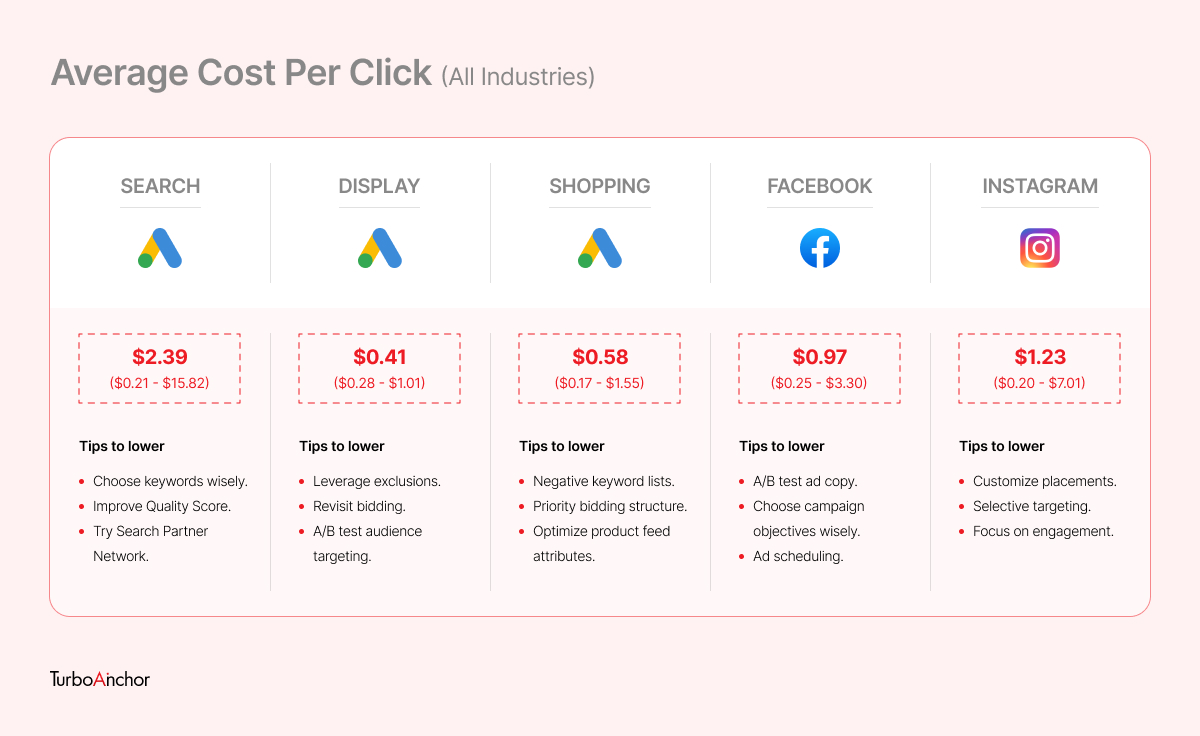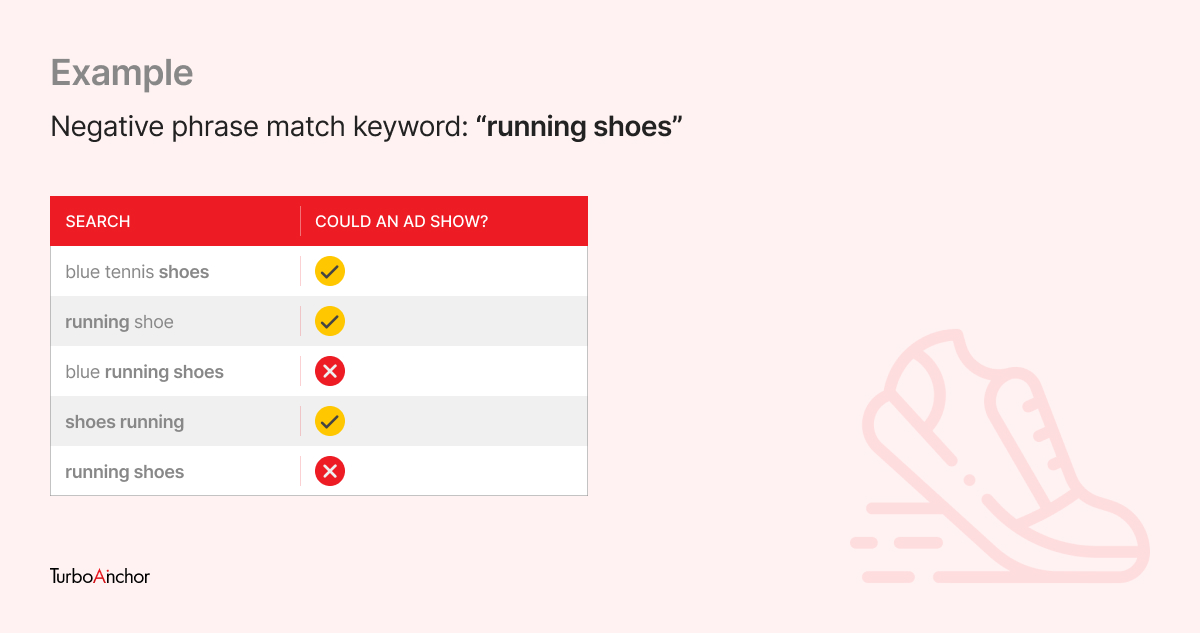In today’s digital world, businesses are working to make use of PPC ads, especially in the area of, How to reduce CPC as low as possible? Ensure that your campaigns are low-cost, which increases the needed (ROI) return on investment. Getting desired results can sometimes be a bit tough. As it’s easier said than done, It requires insight into what factors can help you reduce CPC.

Average cost per click according to WordStream
You can get started in the right direction by following these suggestions:
How to Reduce CPC In Google Search Ads?
1- Go for Long – Tail keywords
Firstly if you plan to reduce your cost per click, you need to take notice of the keywords you are bidding on. In simple words, phrases that consist of 4 or more words are known as “Long-tail keywords”.
Pros and Cons of using long-tail keywords
Well, first, speaking of the pros of using long-tail keywords, they tend to have a much less number of searches linked to them, which results in less competition in terms of bidding. So they are usually much more reasonable than their more general, more concise keyword counterparts.
Then there come its cons: you will have fewer visitors coming to your website. But, thinking on a brighter note, you will be able to achieve more visibility amongst long-tail keywords. Another plus factor of using it is that cause it is so precise that it boosts your chances of conversions.
For example, a user searching for “men’s Jeans.” There are very few chances for that user to purchase it rather than someone who specifically searches for a “Men’s Levi’s Denim Jeans.”

2- Focus on Improving your Ads & Landing page Quality Score
Well, a quality score is Google’s rating that google assigns to every advertisement. For the significance of your keywords, landing page experience, and ad click-through rate. The Quality score specifies the position of your ads and the amount you’re supposed to pay for each click. The score is multiplied by your bid to determine your rank in the ad auction. So with a higher quality score, you get a higher ad rank and can also lower your cost per click.
Someone who wants to improve their quality score can create highly targeted ads that are more relevant to search results.
3- Use Negative Keywords
Negative keywords are additional keywords that you add to your campaigns and ad groups that you don’t want your ads to show. The best way to reduce CPC is to let Google know about the keywords you don’t want to appear in your ads. They can turn out to allow your business to reach its potential audience and avoid wasting costs on unnecessary clicks that don’t deliver results. The success of any paid campaign or ad group is determining who you’re specifically targeting to maximize CTR & conversions eventually—targeting relevant keywords and improving your bidding keywords to boost relevancy and ROI.
Adding negative keywords can help you to reduce CPC,

4- Change Your Bidding Strategy
The next move should be adjusting your bidding strategy. Everyone is likely aware that Google Ads offers multiple bidding strategies, even a few automated bidding strategies.
These automated bidding strategies are,
- Enhanced CPC
- Maximize clicks
- Maximize conversions
- Target CPA
Advertisers mostly go for a manual bidding strategy as they let you fully control your Cost per click numbers. You can bid as high as you want; just a quick reminder that bid up to a certain amount appears in the top results. Bidding below the google suggested amount will not let your ads show. After you get enough conversion data and feel like switching up your bidding strategy well, you can go with a semi-automated bidding strategy, such as enhanced CPC (ECPC). Enhanced CPC, you let google information concerning the maximum amount you are willing to bid on a specific keyword.
5- Lower Your Keywords Bids
Everyone should be aware that keywords play a vital role in ad positioning. Setting keywords bidding can result in your page or business appearing at the top, in between, or at the end of the result page. Trying out different keyword bids will get you the data needed to determine which ad position works well for you. Often the second or third position on the search page gets the best results.
Someone concerned about seeing a major drop in conversion volume can start reducing their bids up to a certain amount ($0.50–$1) and check it out for a week, and then check out its effects on your results.
How to Reduce CPC In Facebook Ads?
Facebook ads are slightly different from Google because you can’t display them on a searcher’s command. But one thing to consider is that Facebook Ads still work on a bidding system, like Google Ads, so if you want your ads to show up to a user while scrolling, you have to optimize a bit.
6- A/B test your ad copy
This method is the relatively simple and cheapest way to optimize your click on Facebook by slightly adjusting your ad copy. You’ll be amazed to know how two different ads within the same ad set can draw in two entirely different average CPCs.
These results are a possible cause of Facebook using machine learning to rank your ad. These ads show people based on two main factors: audience targeting selected by advertisers and the results of your ad. If your ad copy and images don’t drive actions, you’ll pay more for that ad’s click.
For A/B testing your Facebook ads, you can go with the following methods,
- Test switching out images
- Swapping out the CTA buttons or altering the text to increase your Facebook ad’s CPC health.
7- Optimize your ad targeting
First of all, rather than allowing Facebook to select your audience, pick the interests and the geographic locations yourself so that you can target those that best suit your interest.
Secondly, the best way to optimize the CPC of your Facebook ad campaigns is to target a more specific audience with highly relevant ads. You will only bid on who you want to reach by narrowing your target audience. Lastly, create a personalized ad for your audience to make sure you grab their attention. Always highlight the users’ benefits; what the user can get should focus on ads.
8- Separate Campaigns As Per Device Targeting
Unlike desktop, CPC is much lower on mobile devices. There is quite a difference in the size of images, and the same goes for ad copy for every other device. Going for a single-sized fit for all doesn’t work well. Therefore, splitting your campaign according to devices and content placement and using the right images fit precisely into that place.
Conclusion
In the end, reducing your CPC is an achievable goal if you have a piece of complete knowledge about where to make changes within your campaign. All you can do to produce traffic with a high sales objective to your website will benefit you.
Also Read:
- 8 Best! Types of Paid Ads Which You Can Go For
- Paid Advertising Strategies That Every Startup Should Go for
